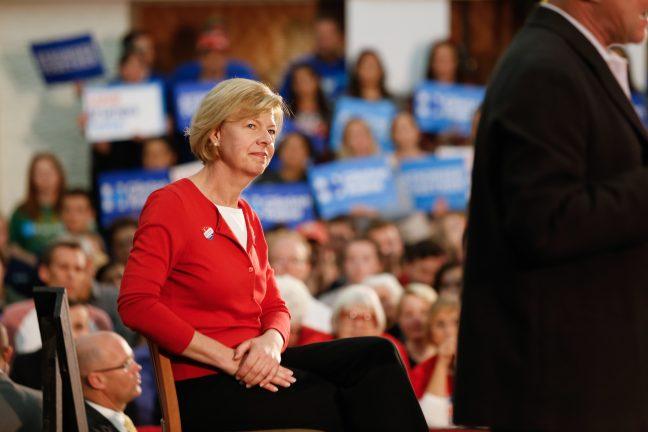Content warning: References to sexual violence, criminal violence and/or other possible traumatic experiences.
Editor’s note: In this article, individuals who have experienced sexual assault or sexual violence will be referred to as survivors, but it should be noted that not all people with these experiences identify with this term.
U.S. Senator Tammy Baldwin and colleagues introduced the Survivor Outreach and Support on Campus Act, or S.O.S. Campus Act Wednesday. The legislation would make it obligatory for every federally funded college and university to have an independent advocate committed to campus sexual assault prevention and response.
According to a press release from Baldwin’s office, the advocate would conduct public information campaigns on sexual assault prevention and provide survivors of sexual assault with emergency and follow-up medical care, instruction on officially reporting assaults to law enforcement, medical forensic exams, many types of counseling and legal information.
According to the results of the 2020 AAU report, the rate of nonconsensual sexual contact by physical force or the inability to consent increased from 2015 to 2019 for undergraduate women, graduate women and undergraduate men.
The University of Wisconsin has a concerning history of sexual violence on campus. In 2019, around 26% of undergraduate women at UW reported having experienced some form of sexual assault, with 11% having experienced assault by penetration, according to a 2020 report by the American Association for American Universities.
While these statistics are concerning, UW is beginning to set high standards for campus advocacy programs. Associate professor in the UW Gender and Women’s Studies and Psychology departments Kate Walsh has already implemented a program at UW similar to Baldwin’s vision. In 2020, Walsh was awarded a $500,000 federal grant with which she spearheaded a program on campus that expands sexual assault services on campus through medical forensic care and advocacy.
Walsh’s program brings rape kits to students rather than requiring them to travel to Meriter Hospital, which was the only place students could get a rape kit prior to Walsh’s program. Additionally, Walsh’s grant allowed funding for one full-time advocate to encourage victim empowerment, which includes meeting with survivors to gauge what sorts of emotional, physical and academic support they may need.
Prior to Walsh’s grant, UW offered medical and mental health services for survivors, but there were no full-time advocates.
In an email statement to the Badger Herald, Walsh said she appreciates that the legislation clarifies that the advocate serves the survivor’s interests even if they conflict with the institution’s best interests, prohibits institutional retaliation against the advocate, mandates the need for some 24-hour victim assistance services and requires a feedback mechanism where the advocate has to detail how their services were used.
While Walsh praises this legislative effort and sees it as progress, one full-time advocate has not been enough to serve the large number of students on the UW campus who experience sexual violence each year, and it is doubtful that one person could provide the 24/7 services that are required even on a small campus.
Baldwin’s legislations recognizes the efforts of local rape crisis centers like the Rape Crisis Center and other organizations like Promoting Awareness Victim Empowerment, who have stepped up to help support survivors at UW. In the press release, Baldwin makes clear that it is essential to “either consult with or partner with these organizations to ensure that survivors get the services they need.”
At UW, PAVE plays a crucial role in supporting survivors and educating students through peer education workshops, volunteer events, all-campus events and campaigns to raise awareness. Walsh worked closely with PAVE as she worked to bring her program to fruition, but it puts an undue burden on PAVE — an underpaid student group.
“I think an advocacy program that is well-staffed could substantially reduce burden on student groups like PAVE and the local Rape Crisis Center but with a single person in that role, it will be important to leverage connections with those other groups and organizations to ensure more students are served,” Walsh said in the email statement.
While this is obviously a step in the right direction, Walsh said there are a few things the legislation is missing. Namely, Walsh said she wishes there was some legal protection clarifying that advocates have the privilege to resist a subpoena to disclose information about the survivor against the survivor’s wishes.
This legislation could ensure the continuation of the program, which has been popular among students who have sought support, according to Walsh. The campus is already thinking creatively about how to grow the program with plans to hire at least one more advocate this year.
This program serves as a model for programs other universities might implement should Baldwin’s legislation pass. In her press release, Baldwin said the legislation will “make sure sexual assault survivors have access to the proper medical, mental health and legal services they need at our places of higher education.”
This Act would amend Part B of Title I of the Higher Education Act of 1965, which was created to bolster resources for U.S. colleges and universities and to assist students financially in postsecondary and higher education. The new legislation is led by Senator Tim Kaine (D-VA) and is cosponsored by Senators Dianne Feinstein (D-CA) and Mazie Hirono (D-HI), according to the press release.
Walsh said she loves that Baldwin introduced legislation to mandate access to an advocate.
“I hope this legislation increases broad institutional awareness of the value of comprehensive advocacy and allows more students who have experienced sexual violence to get connected to the care and resources needed,” Walsh said.
Resources regarding sexual assault:
- UHS Survivor Services: survivorservices@uhs.wisc.edu, 608-265-5600 ext 3
- www.uhs.wisc.edu/survivor/ Self-schedule using Starfish app
- Rape Crisis Center: (608)-251-7273
- Let’s Talk: uhs.wisc.edu/wellness/lets-talk
- “Sex, Sexuality and Healthy Relationships” section
- Room to be Safe: For Queer survivors of violence: (414) 856-LGBT (5428)
- National Sexual Assault Hotline: 1-800-656-HOPE (4673)
- National Domestic Violence Hotline: 1-800-799-SAFE (7233) or 1-800-787-3224


